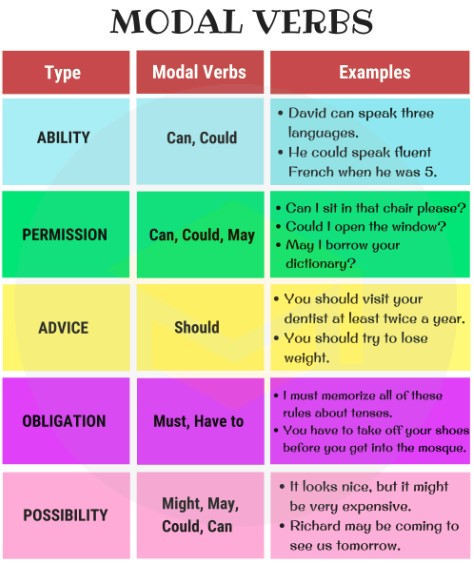The English language boasts an array of tools that help us articulate our thoughts, feelings, and situations with precision. Among these tools, modal verbs stand out for their unique ability to convey necessity, possibility, obligation, and much more.
Understanding Modal Verbs
Modal verbs are auxiliary verbs that don’t function on their own but modify the main verb to express modality. They are always followed by the base form of a verb and don’t change according to number or person.
The Panorama of Modal Verbs
Let’s delve deeper into the universe of modals, exploring each one in detail:
Can
Ability: She can sing beautifully.
Permission: Can I leave early today?
Possibility: It can get really cold in winters here.
Could
Past Ability: I could dance all night when I was younger.
Polite Request: Could you lend me a pen?
Possibility: That could be Mary calling.
Will
Future: I will join the gym tomorrow.
Offer: I’ll help you with your bags.
Prediction: I think it will rain later.
Would
Polite Offer: Would you care for some dessert?
Habitual Past Action: Every evening, he would walk his dog.
Hypothetical Situation: I would move to Japan if I knew the language.
Shall
Offer: Shall we dance?
Future Plans (more traditional): I shall write to you soon.
Suggestion: What shall we do this weekend?
Should
Advice: You should try this new restaurant.
Expectation: They should be here by 8 pm.
Obligation: He should send the letter today.
May
Permission: May I have another slice of cake?
Possibility: The meeting may extend till 5 pm.
Might
Less Probability: He might not attend the wedding.
Suggestion: You might want to reconsider your decision.
Must
Obligation: We must pay our taxes on time.
Prohibition: You must not enter without permission.
Logical Assumption: Given the clues, the culprit must be John!
Ought to
Advice: You ought to respect your elders.
Moral Duty: We ought to help the less fortunate.
Used to
Past Habits: I used to go jogging every day.
Dare
Challenge: I dare say he won’t come.
Courage: Dare he confront the manager?
Need
Necessity: You need not bring any food. (Often found in negative constructions)
Complexities and Nuances
Modal verbs aren’t always straightforward. For instance, ‘need’ in its non-modal form requires an auxiliary (She needs to rest). In its modal form, it doesn’t (She need not rest).
Furthermore, while ‘can’ and ‘could’ or ‘will’ and ‘would’ seem to pair up in present and past, others, like ‘must’, lack an exact past modal counterpart. Instead, we might use alternative structures like “had to.”
- Variability in Meaning: Many modals serve multiple purposes based on context. For instance, ‘can’ can denote ability (“She can swim”), permission (“Can I use your laptop?”), or possibility (“It can snow tomorrow”).
- Lack of Direct Past Form: While ‘will’ becomes ‘would’ and ‘can’ turns into ‘could’ in certain past contexts, not all modals have direct past forms. ‘Must’, for instance, lacks a past equivalent. Instead, we might use “had to” for past obligations.
- Formal vs. Informal Usage: Some modals are more formal than others. While ‘may’ and ‘might’ can both be used to indicate possibility, ‘may’ is often considered more formal.
- Absence of Infinitive or Gerund Forms: Modals don’t have infinitive (to can, to will) or gerund (canning, willing) forms. This sets them apart from regular verbs.
- Special Cases – “Used to” and “Dare”: These two are sometimes considered semi-modals. “Used to” denotes a past habit, while “dare” is about courage or challenging.
Diving into the Negative
Modal negatives often flip the meaning of a sentence, introducing doubt, prohibition, or negation. Here’s a glimpse:
Can – Can’t (Cannot): From ability or permission to inability or denial of permission.
E.g., “I can swim” vs. “I can’t swim.”
Will – Won’t (Will not): From a future action or prediction to its negation.
E.g., “It will rain” vs. “It won’t rain.”
Could – Couldn’t (Could not): From past ability or possibility to its opposite.
E.g., “I could see the mountain” vs. “I couldn’t see the mountain.”
Should – Shouldn’t (Should not): From advice or expectation to advice against or negative expectation.
E.g., “You should go” vs. “You shouldn’t go.”
Must – Mustn’t (Must not): From an obligation to a strong prohibition.
E.g., “You must wear a helmet” vs. “You mustn’t touch that switch.”
May – May not: From a possibility or permission to its negative.
E.g., “You may enter” vs. “You may not enter.”
Might – Might not: From a lesser possibility to its negation.
E.g., “She might come” vs. “She might not come.”
Dare – Daren’t (Dare not): From a challenge to a doubt in courage.
E.g., “Dare he confront?” vs. “He daren’t confront.”
Conclusion
Modal verbs are intrinsic to the English language, offering a palette of nuances to speakers. They enable us to gracefully navigate diverse scenarios, from making polite requests to emphatically stating necessities. As you integrate these modals into your daily use, you’ll find yourself expressing thoughts with increased clarity, politeness, and precision. Modal verbs, while small in stature, play a monumental role in the dynamics of English language communication. Their complexities and nuances can be puzzling, but with focused understanding and practice, they can be deftly wielded to add finesse to your linguistic repertoire.
